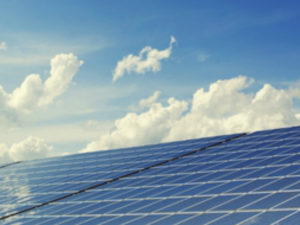 by Joseph L. Fiordaliso, President for New Jersey Board of Public Utilities (NJBPU)
by Joseph L. Fiordaliso, President for New Jersey Board of Public Utilities (NJBPU)
View the entire newsletter for more articles: 2019 – NJAC County Biz – June
As the cost of renewable energy continues to drop, “going solar” becomes a viable option for more New Jerseyans. Over 100,000 homes and businesses in our state now benefit from solar, many of which are seeing savings on their utility bills. Governor Phil Murphy and NJBPU are advancing renewables in the Garden State. However, not everyone is able put solar panels directly on their roof. To address that, New Jersey just launched its first Community Solar Energy Pilot Program, and started accepting applications in April. This Pilot Program is intended to increase access to solar energy for New Jersey ratepayers.
The community solar model is being adopted nationwide because it provides more equitable access to the clean-air and money-saving benefits of solar. Unlike traditional solar installations, a community solar project does not need to be placed directly on a ratepayer’s own roof. As long as it is located within the subscriber’s electric utility service territory, the system of panels can be installed—for example—over a neighborhood parking lot, atop an apartment complex, or even on a municipal landfill or brownfield.
The power produced by the solar installation is divided among multiple participants, known as subscribers, who can choose either to purchase an ownership share of the system or sign up for a monthly subscription. Community solar subscribers – who can be residential, commercial, or industrial – receive a credit on their monthly utility bills equivalent to their share of the solar energy produced.
The flexibility of community solar makes “going solar” accessible for more customers, especially those who previously could not install solar for reasons like cost, roof unsuitability, or lack of roof control. This segment of customers often includes renters, apartment dwellers, and low-income households.
In New Jersey’s Community Solar Pilot Program, which is administered through NJBPU’s Clean Energy Program, each community solar project must have at least 10 subscribers. Landlords of master-metered multi-family buildings may apply, but must provide proof that they will pass the savings on to their tenants. Subscriptions are portable within the geographic limits of the project, and may be sold back to the project owner.
New Jersey’s program will allocate 40% of the program capacity – a number much higher than many other states’ programs — to projects that serve low- and moderate-income communities. This will allow underserved households and environmental justice communities to benefit from renewable energy while seeing credits on their electricity bills that are equal to or greater than the amount of their subscriptions.
More details about the Community Solar Energy Pilot Program and application forms are available on the Clean Energy Program website’s community solar information page. Applications will be evaluated for completeness, and scored based on the criteria found at the end of the application packet. The deadline for applications is Sept. 9. Questions and requests for more information may be emailed to NJBPU’s Clean Energy Program.m solar, many of which are seeing savings on their utility bills. Governor Phil Murphy and NJBPU are advancing renewables in the Garden State. However, not everyone is able put solar panels directly on their roof. To address that, New Jersey just launched its first Community Solar Energy Pilot Program, and started accepting applications in April. This Pilot Program is intended to increase access to solar energy for New Jersey ratepayers.
